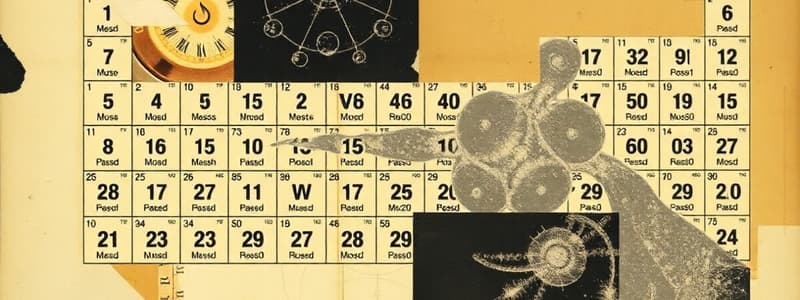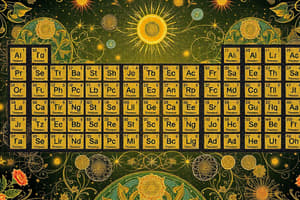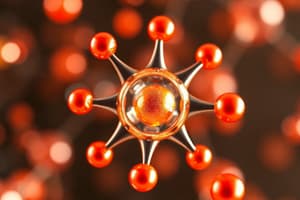Podcast
Questions and Answers
What is the calculated atomic mass of element Y based on the given percentages and atomic masses?
What is the calculated atomic mass of element Y based on the given percentages and atomic masses?
- 150.0 amu
- 150.5 amu
- 152.0 amu
- 151.96 amu (correct)
Which element has an atomic number of 29?
Which element has an atomic number of 29?
- Copper (correct)
- Aluminum
- Nickel
- Zinc
In the compound CaF2, how many total ions are present?
In the compound CaF2, how many total ions are present?
- 4
- 2
- 1
- 3 (correct)
Which type of metal is represented in the periodic table by alkali metals?
Which type of metal is represented in the periodic table by alkali metals?
What type of compound is CaF2 categorized as?
What type of compound is CaF2 categorized as?
Which of the following is true regarding the molecule SF6?
Which of the following is true regarding the molecule SF6?
What is the relationship between protons, neutrons, and the total mass of an atom?
What is the relationship between protons, neutrons, and the total mass of an atom?
What is the total number of neutrons in the isotope U-238?
What is the total number of neutrons in the isotope U-238?
What percentage of the final course grade is allocated to the final term exam?
What percentage of the final course grade is allocated to the final term exam?
Which of the following components contribute to in-class assessment?
Which of the following components contribute to in-class assessment?
Which skill involves using proper abbreviations and symbols related to inorganic chemistry?
Which skill involves using proper abbreviations and symbols related to inorganic chemistry?
What is the weight of midterm exams in the overall assessment structure?
What is the weight of midterm exams in the overall assessment structure?
What does the course expect students to illustrate using qualitative analytical methods?
What does the course expect students to illustrate using qualitative analytical methods?
Which learning outcome is related to communicating effectively during tutorials?
Which learning outcome is related to communicating effectively during tutorials?
How many activities contribute to the overall course grade?
How many activities contribute to the overall course grade?
Students must be on time to avoid being considered absent, which is defined as being late by how many minutes?
Students must be on time to avoid being considered absent, which is defined as being late by how many minutes?
What is the correct calculated mass percentage of sodium in sample A?
What is the correct calculated mass percentage of sodium in sample A?
Which of the following conclusions can be drawn from the observed data of samples A and B?
Which of the following conclusions can be drawn from the observed data of samples A and B?
According to the law of definite proportion, what must be true for two samples of the same compound?
According to the law of definite proportion, what must be true for two samples of the same compound?
Which of the following statements correctly describes the law of multiple proportions?
Which of the following statements correctly describes the law of multiple proportions?
What mass ratio of oxygen in carbon dioxide to oxygen in carbon monoxide is calculated as being consistent with the law of multiple proportions?
What mass ratio of oxygen in carbon dioxide to oxygen in carbon monoxide is calculated as being consistent with the law of multiple proportions?
According to the provided information, how much oxygen is present in 1.00g of carbon from carbon monoxide?
According to the provided information, how much oxygen is present in 1.00g of carbon from carbon monoxide?
What would be the mass percentage of oxygen in sample B?
What would be the mass percentage of oxygen in sample B?
Based on the data provided, how does the total mass of sodium compare to total mass of oxygen in both samples?
Based on the data provided, how does the total mass of sodium compare to total mass of oxygen in both samples?
What is the total mass of carbon in a sample of chloroform that contains 30.0g of chlorine and 1.01g of hydrogen?
What is the total mass of carbon in a sample of chloroform that contains 30.0g of chlorine and 1.01g of hydrogen?
If sample A has a total mass of 1.020g, what is the mass of oxygen?
If sample A has a total mass of 1.020g, what is the mass of oxygen?
Which of the following statements correctly defines the law of definite composition?
Which of the following statements correctly defines the law of definite composition?
In which of the following compounds is the ratio of carbon to chlorine different from the chloroform sample mentioned?
In which of the following compounds is the ratio of carbon to chlorine different from the chloroform sample mentioned?
Which experimental result supports the conclusion that samples A and B are the same compound?
Which experimental result supports the conclusion that samples A and B are the same compound?
Which numerical value represents the weight of chlorine in a sample of chloroform that contains 12.0g of carbon?
Which numerical value represents the weight of chlorine in a sample of chloroform that contains 12.0g of carbon?
What percentage of carbon is present in carbon dioxide by mass?
What percentage of carbon is present in carbon dioxide by mass?
Using the law of multiple proportions, if a sample of carbon monoxide contains 42.9g of carbon, how much oxygen must it contain?
Using the law of multiple proportions, if a sample of carbon monoxide contains 42.9g of carbon, how much oxygen must it contain?
What is the amount of chlorine produced when the amount of carbon is increased by a factor of 2.5?
What is the amount of chlorine produced when the amount of carbon is increased by a factor of 2.5?
What is the total mass of oxygen in the smaller CaCO3 sample if 3.203 g of calcium and 0.9608 g of carbon were present?
What is the total mass of oxygen in the smaller CaCO3 sample if 3.203 g of calcium and 0.9608 g of carbon were present?
How do the masses of oxygen in nitric oxide (NO) and nitrogen dioxide (NO2) compare?
How do the masses of oxygen in nitric oxide (NO) and nitrogen dioxide (NO2) compare?
In sulfur dioxide, if 90.00 g of sulfur is combined with oxygen, what is the mass of oxygen that combines with 1 g of sulfur?
In sulfur dioxide, if 90.00 g of sulfur is combined with oxygen, what is the mass of oxygen that combines with 1 g of sulfur?
What can be inferred about the amounts of oxygen in sulfur dioxide and sulfur trioxide when comparing their compositions?
What can be inferred about the amounts of oxygen in sulfur dioxide and sulfur trioxide when comparing their compositions?
Which of the following compounds illustrates the law of multiple proportions?
Which of the following compounds illustrates the law of multiple proportions?
If thermal decomposition of a smaller sample produced 3.203 g of calcium and 0.9608 g of carbon, what is the remaining mass attributed to oxygen in sample 2?
If thermal decomposition of a smaller sample produced 3.203 g of calcium and 0.9608 g of carbon, what is the remaining mass attributed to oxygen in sample 2?
What is the relationship between the mass of nitrogen and the mass of oxygen in nitric oxide and nitrogen dioxide?
What is the relationship between the mass of nitrogen and the mass of oxygen in nitric oxide and nitrogen dioxide?
Flashcards are hidden until you start studying
Study Notes
Atomic Mass Calculation
- The atomic mass of an element (Y) can be calculated by averaging the atomic mass of its isotopes (Y1 and Y2), weighted by their respective percentages.
- For example, the atomic mass of an element Y is 151.96 amu, given that Y1 has an atomic mass of 150.9 amu and a percentage abundance of 47%, and Y2 has an atomic mass of 152.9 amu and a percentage abundance of 53%.
Modern Periodic Table
- The periodic table organizes elements based on their atomic number and chemical properties.
- It includes groups (columns) and periods (rows), with elements classified into specific categories like alkali metals, alkaline earth metals, transition metals, halogens, and noble gases.
Atomic Structure
- An atom consists of protons, neutrons, and electrons.
- Protons and neutrons reside in the nucleus, while electrons orbit the nucleus.
- The atomic number (Z) represents the number of protons in an atom, which determines its identity as an element.
Isotopes
- Isotopes of an element have the same number of protons but differ in the number of neutrons.
- This difference in neutron count results in variations in atomic mass.
Molecules and Ions
- A molecule is formed when two or more atoms combine through covalent bonds, sharing electrons.
- An ion is an atom or molecule that carries an electric charge, formed by gaining or losing electrons.
- Ionic compounds (salts) are formed by electrostatic attraction between oppositely charged ions.
Law of Definite Proportions
- A chemical compound always contains the same elements in the same proportions by mass regardless of the source of the compound.
- This means that the percentage of each element in a compound remains constant.
- Example: Two samples of a compound, sodium oxide, were analyzed and found to have the same mass percentages of sodium and oxygen, confirming the law of definite proportions.
Law of Multiple Proportions
- If two elements (B and N) combine to form more than one compound (BN, BN2, BN3…), then the ratios of the masses of the other element (N) in the other compounds exist in small whole numbers.
- This law helps determine the ratio of elements in different compounds formed by the same two elements.
- Example: Carbon monoxide (CO) and carbon dioxide (CO2) are both formed by carbon and oxygen. The ratio of oxygen masses in these two compounds is 2:1, illustrating the law of multiple proportions.
Application of Laws
- These laws are fundamental in understanding and predicting the composition of chemical compounds.
- They are used in numerous applications, including chemical analysis, synthesis of new compounds, and understanding chemical reactions.
Studying That Suits You
Use AI to generate personalized quizzes and flashcards to suit your learning preferences.




